If the petunias suddenly turn yellow on your windows and no longer look very decorative, then you are dealing with chlorosis.
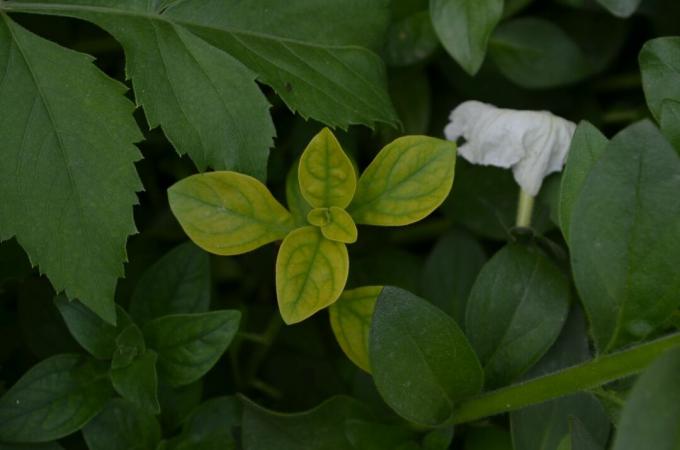
Like all of our plants, our balcony flowers also need the right nutrients to grow magnificently. If your Petunias (Petunia) the leaves, especially the young leaves, turn yellow, then it is most likely a chlorosis caused by a lack of nutrients.
contents
- Detect chlorosis in petunias
- Prevent chlorosis in petunias
- Lime and pH: What Else You Should Know About It
- Fight and treat chlorosis in petunias
Detect chlorosis in petunias
The missing nutrient is iron (Fe-ferrum). A typical symptom of chlorosis in petunias is that the green leaves turn yellow, but the leaf veins remain green. Plants need iron for the formation of enzymes, for the metabolism, for the formation of chlorophyll and thus also for breathing and photosynthesis. If this nutrient is now missing, however, it not only results in the discoloration, but also through the lack of Chlorophyll, photosynthesis is hindered and the plants can no longer produce certain enzymes and hormones.
How to recognize an iron deficiency in your petunias or surfinias:
- Young leaves are affected
- The leaves turn yellow, only the leaf veins remain green
- Stunted growth
Prevent chlorosis in petunias
So that you don't have any problems with chlorostic petunias due to iron deficiency, we have a few tips ready for you below. Since petunias are so-called heavy eaters, they need a lot of nutrients and also a lot of water.
However, one should also pay attention to the irrigation water. If you always pour the petunias with hard water from the tap, i.e. water that contains a lot of lime, the pH value in the soil can change. A change in pH can lead to certain nutrients - such as iron in one too high pH value in the soil - no longer or only to a significantly lesser extent can. Therefore, you should use soft water (rainwater) for watering if your tap water is very lime-rich.
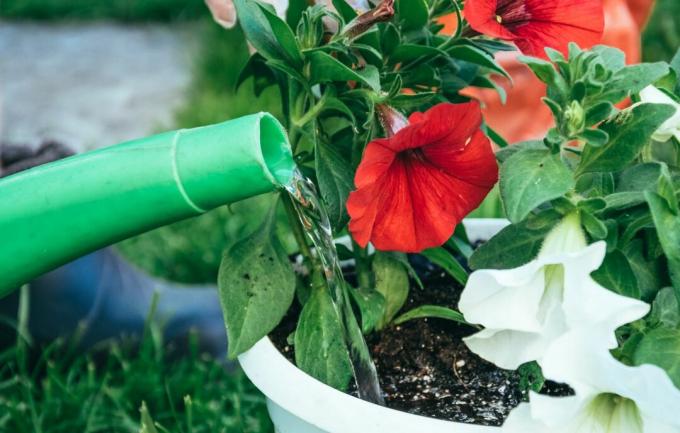
Use a loose and nutrient-rich substrate when planting to give your petunias a good start in life. Repotting in fresh soil can also be helpful, especially for petunias in pots that show symptoms of chlorosis. This gives the plant fresh nutrients again, because the frequent watering can flush out many nutrients that the plant needs. Repotting after overwintering is also advantageous and recommended. Here you can find out more about wintering and the right one Caring for petunias.
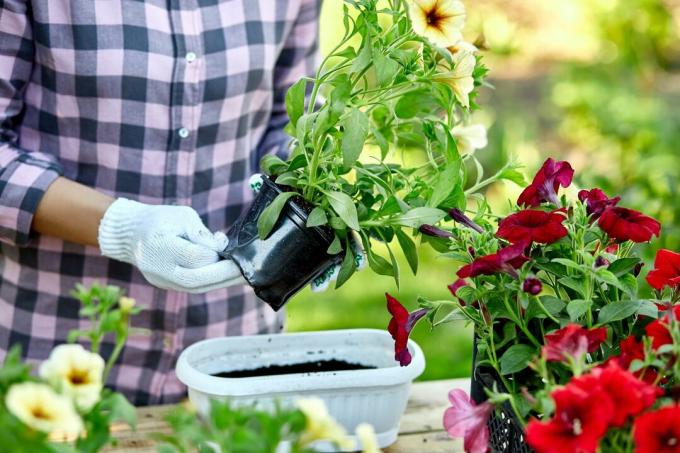
Lime and pH: What Else You Should Know About It
There's always a lot going on about pH and lime, so what's this all about? The pH value expresses the concentration of hydrogen ions, i.e. the more hydrogen ions there are, the more acidic the solution.
The terms acidic, basic, alkaline and neutral can be found again and again in connection with the pH value:
- Basic and alkaline mean the same thing, namely a pH value above 7.5
- neutral means a pH value of 6-7.5
- Acid means a pH value below 6
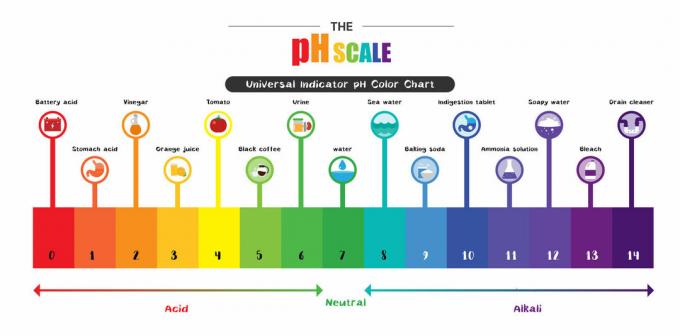
For the plants, the pH value of the soil is important for the availability of nutrients, also known as nutrient salts. The optimal pH for most plants is between 5.5 and 6.5. Extreme pH values can damage plant organs. Extremely high or low pH values are also responsible for the fact that nutrients are fixed in the soil and are not available to the plants.
A higher pH value results in a deficiency in phosphorus or iron, whereas a lower value results in a deficiency in magnesium or molybdenum, for example. This nutritional deficiency is caused by the unavailability of these nutrients and caused by the pH level.
The water hardness is determined by calcium and magnesium carbonates and has an alkaline effect. This allows the pH of the substrate to be influenced by the pouring. Water with a high hardness can increase the pH. You can recognize hard water by the fact that it is on all objects that come into contact with the tap water Come into contact, white crusts form, for example in the kettle, on the faucets or in the Shower cubicle.
Fight and treat chlorosis in petunias
The chlorosis in petunias is easy to get rid of. The easiest way is through correct and appropriate fertilization.
Fertilize petunias
Treat your petunias with a special surfinia and petunia fertilizer. In addition to the nutrients nitrogen (N), phosphorus (P) and potassium (K), which are required to a large extent, these NPK fertilizers also contain iron (Fe) and help your flowers grow. You can use petunia fertilizer regularly, depending on the fertilizers used. This can also be used to prevent deficiency symptoms.
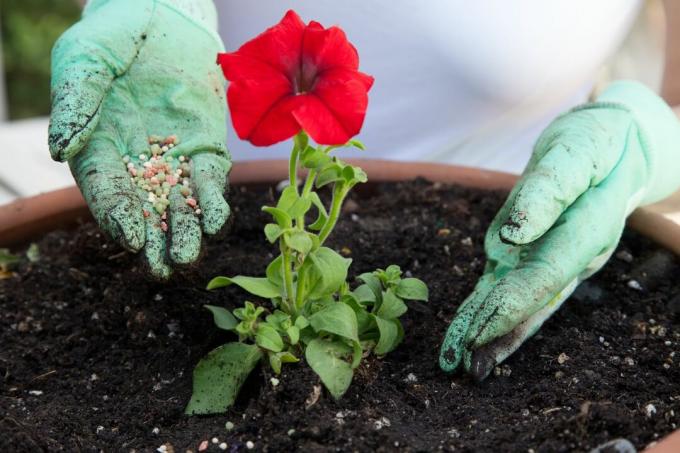
These fertilizers are available in liquid form and are simply added to the irrigation water. But there are also fertilizers in solid crystalline form that are simply dissolved in the water. Since iron can be absorbed by the petunias through the roots and through the leaves, foliar fertilization can also be used against the iron deficiency.
Foliar fertilization of petunias
You can also use special ferrous fertilizers on your petunias. These fertilizers also contain nitrogen to aid growth. When spraying the leaves with iron fertilizer, avoid direct sunlight. It is therefore recommended to use it in the evening. Foliar fertilization is an optimal way to combat iron deficiency, as this fertilizer cannot be washed out with the irrigation water. Be careful with dosing though: overdosing can cause even more damage to your petunias.
Also avoid contact with the fertilizer solution, as these iron fertilizers can leave unsightly rust stains on your clothes or on your floor.
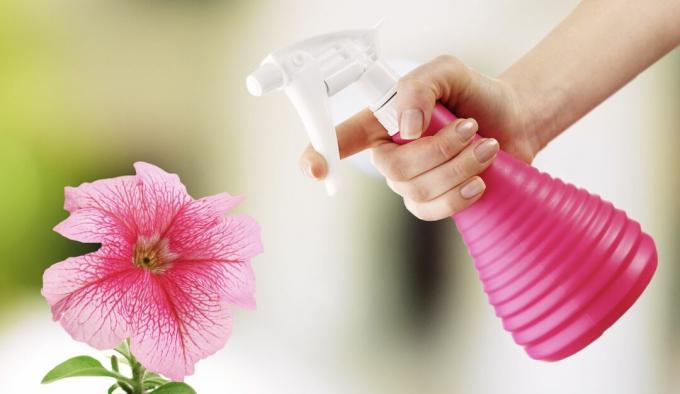
Always pay attention to the recommended quantities, because an oversupply can also damage your plants.
Powdered rock for petunias
You can also put rock flour in the earth to compensate for the iron deficiency. Rock flour can also be brought in when planting in order to supply the petunias with nutrients right from the start.
You can find out more about the right one here Care of petunias and how best to bring this over the winter.
We recommend these products for the treatment & prevention of chlorosis:- pH soil test set: Soil test set for easy and precise determination of the lime requirement. The set is sufficient for 8 applications.
- Floragard Bio Rhodohum: Organic special soil without peat for planting lime-sensitive bog plants. The organic fertilizers Flora-Bio-Mix and Flora-Phyto-Mix ensure healthy plant growth and magnificent flowers and the low pH value optimizes the supply of nutrients for healthy growth.
- Floragard compost soil: Special soil made from weed-free fine compost and selected peat qualities. It supplies your plants with all the important nutrients over a long period of time and the high humus content makes light and heavy soils fertile.
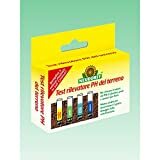
Neudorff 00125 pH soil test
4,90€
Details →

Floragard Rhodohum 40 L • special soil • for rawododendrons, azaleas, ...
10,99€
Details →

Floragard Compost Earth 60 L
9,99€
Details →



